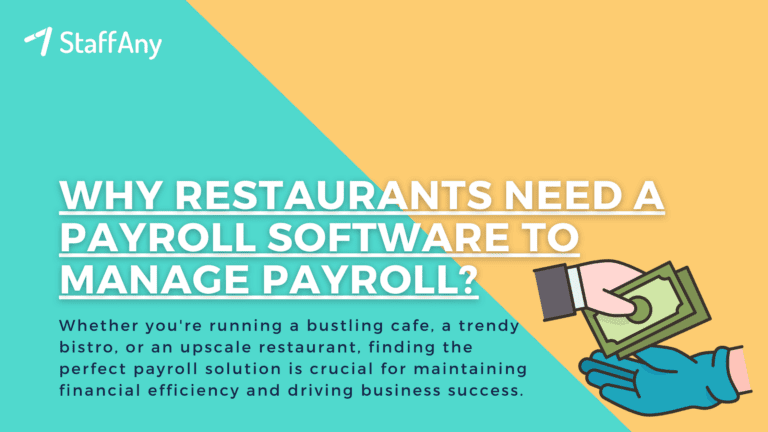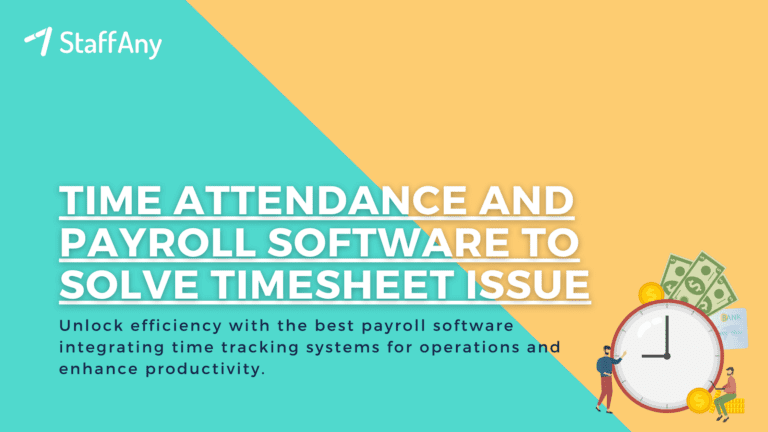One of the crucial aspects of successful restaurant management is its staff. As a restaurant manager, managing a restaurant staff can be challenging, but it’s not impossible.
The right team can help drive your restaurant’s success, while a disorganised or poorly managed staff can lead to unhappy customers, low productivity, and, ultimately, a decline in sales.
In this article, we’ll discuss some essential tips on how to manage restaurant staff effectively. Let’s find out below!
The Importance of Managing Your Restaurant’s Staff

Managing your restaurant staff is crucial for the success of your business. Let’s take a closer look at the importance of managing your restaurant staff and the benefits that come with it.
1. Ensures Consistent Customer Service
Customers expect a high level of service when they dine at your restaurant. Effective management of your staff ensures that your employees are trained to deliver the level of service that your customers expect.
It also helps to ensure that your employees are consistent in their approach to customer service, which is important for building a loyal customer base.
2. Improves Staff Retention
High staff turnover can be a significant challenge for restaurant owners. Effective management of your staff members can help to improve staff retention by providing your employees with a positive work environment, and opportunities for career growth. This can help to reduce staff turnover and ensure that you have a stable workforce.
Read more: Staff Turnover in F&B Industry: Implications and Causes
3. Increases Productivity
Effective management of your staff can also increase productivity in your restaurant. By ensuring that your employees are well-trained and have clear expectations for their performance, you can help them to be more efficient and effective in their work. This can lead to faster service times, higher customer satisfaction, and increased revenue for your restaurant.
4. Reduces Costs
Effective management of your staff can also help to reduce costs in your restaurant. By managing your staff efficiently, you can reduce the amount of time and resources required to train new employees. You can also reduce the costs associated with staff turnover by improving staff retention rates.
5. Improves Compliance with Labor Laws
Managing your staff effectively also helps to ensure that you are in compliance with labor laws and regulations. This can help to protect your restaurant from legal issues and penalties, which can be costly and damaging to your restaurant business reputation.
Read more: Top 8 F&B Technology Trends for Business Owners to Utilise
10 Key Management Skills for Restaurant Managers
A restaurant manager requires a diverse set of skills to effectively oversee the restaurant operations and ensure its success. Some key management skills for a manager include:
1. Leadership
An effective manager should be able to lead and inspire their team, set a positive example, and motivate employees to deliver their best performance.
2. Communication
Clear and open communication is crucial for conveying expectations, instructions, and feedback to staff, as well as interacting with customers and suppliers.
3. Problem-Solving
A professional manager must be adept at quickly identifying and resolving issues that arise, whether they involve customer complaints, staffing challenges, or operational problems such inventory management.
4. Customer Service
Providing exceptional customer service is a fundamental aspect of the restaurant. Managers should ensure that guests have a positive experience and handle any customer concerns effectively.
5. Team Building and Training
Hiring, training, and developing a skilled and cohesive team is vital. Managers should foster teamwork, provide ongoing training, and create opportunities for staff growth.
Read more: How to Train Restaurant Staff to Improve Efficiency
6. Time Management
All managers need to juggle various tasks and responsibilities, making effective time management essential for prioritizing tasks and ensuring efficient operations.
7. Financial Management
Budgeting, cost control, and financial analysis are critical to managing the restaurant’s profitability. Managers should understand financial reports and make informed decisions to optimize revenue and minimize expenses.
8. Organizational Skills
Managing reservations, inventory, schedules, and other operational aspects requires strong organizational skills to keep the restaurant running smoothly.
9. Conflict Resolution
Handling conflicts among staff members or with customers requires diplomacy and the ability to find amicable solutions to maintain a harmonious work environment.
10. Adaptability
The restaurant industry can be dynamic and unpredictable. Managers should be flexible and able to adapt to changing circumstances, such as shifts in customer demand or unexpected challenges.
Developing and honing these skills can contribute to a restaurant manager’s ability to create a positive work environment, provide excellent customer service, and drive the restaurant’s success.
Read more: Understanding Manpower Planning and Its Importance in F&B
How to Manage Restaurant Staff Effectively
Effective management of restaurant team requires a combination of leadership skills, communication skills, and knowledge of the restaurant industry. Here are some tips on how to manage your restaurant staff effectively:
1. Hire the Right People
One of the most important steps in managing your restaurant staff is to hire the right people. Look for candidates who have the right skills and experience for the job, but also consider their personality and how they will fit into your restaurant’s culture.
When you are hiring new employees, make sure you have a clear job description and a set of standards that you expect them to meet.
Also, be transparent about the working hours, pay rate, and any other benefits they will receive. This will help you avoid any misunderstandings later on.
2. Train Your Staff Well
Once you have hired the right people, it’s crucial to train them well. Your employees should be trained on everything from the menu items to the customer service standards.
Make sure they understand your restaurant’s vision, mission, and values, as well as how they can contribute to achieving them.
Provide your staff with ongoing training opportunities to improve their skills and knowledge. This can include regular staff meetings, online training modules, or even sending them to industry conferences.
Read more: 7 Effects of Staff Training Program on Employee Performance
3. Set Clear Expectations
To manage your staff effectively, it’s important to set clear expectations for their performance. This includes defining their roles and responsibilities, outlining the standards for customer service, and establishing clear policies and procedures for dealing with any issues that may arise.
Make sure your staff understands what is expected of them and how their performance will be evaluated. Provide them with regular feedback, both positive and constructive, to help them improve their performance.
4. Communicate Effectively
Effective communication is key to managing your restaurant staff. Make sure you have an open-door policy that allows your employees to approach you with any concerns or questions they may have. Encourage them to share their ideas and suggestions for improving the restaurant’s operations.
Communicate regularly with your staff, both one-on-one and in group settings. Keep them informed of any changes in policies or procedures, and provide them with updates on the restaurant’s performance.
5. Reward and Recognize Your Staff
Finally, it’s important to reward and recognize your staff for their hard work and dedication. This can include bonuses, promotions, or even a simple “thank you” for a job well done. Recognizing your employees’ contributions will help to build morale and motivation, as well as lead to a better dining experience for your customers.
Read more: 15 Employee Engagement Activities to Keep Your Staff Happy and Motivated
StaffAny: Your One-Stop Solution
Effective management of your restaurant’s staff is critical to the success of your establishment. It helps to ensure consistent customer service, improve staff retention, increase productivity, reduce costs, and improve compliance with labour laws.
By implementing best practices for managing your staff, you can create a positive work environment that drives the success of your restaurant.
Managing restaurant staff can be a challenging task, but with the right tools and resources, it can be made easier. StaffAny is a leading HR timesheet software that provides a range of features to help you manage your restaurant’s staff effectively.
With StaffAny, you can easily schedule shifts, track attendance, and manage payroll for your staff. The software also provides real-time analytics and insights into your staff’s performance, enabling you to make data-driven decisions to improve productivity and reduce costs.
If you’re ready to take your restaurant’s staff management to the next level, consider StaffAny as your one-stop solution. With its range of features and benefits, it can help you to improve productivity, reduce costs, and streamline your staff management processes. Visit StaffAny to learn more!











